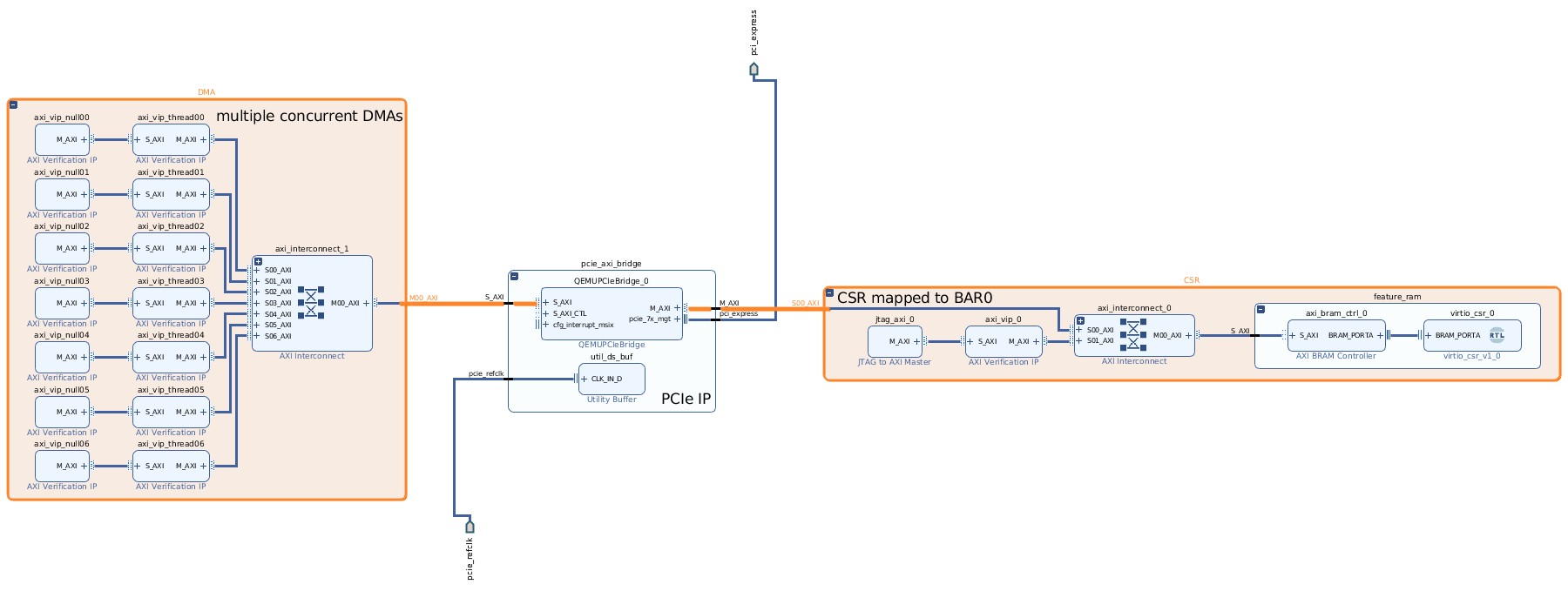virtio-fpga: A platform for emulating Virtio devices with FPGAs
Follow the procedure to run the emulation.
The Virtio device follows a common structure of PCIe CSR-DMA model. The feature_ram, which is the CSR, is a PCIe target mapped to BAR0; The axi_vip_thread modules, which are the multiple concurrent DMAs, are the PCIe initiators generating read/write transactions to the host memory. The behavior models of the multiple concurrent DMAs are:
1. dma_transaction_thread00.v Capture Queue Notify
2. dma_transaction_thread01.v Read Available Ring flags+index
3. dma_transaction_thread02.v Read Available Ring elements, and Prefetch Descriptor Chain
4. dma_transaction_thread03.v Handle ReceiveQueue
5. dma_transaction_thread04.v Handle TransmitQueue
6. dma_transaction_thread05.v Handle ControlQueue
7. dma_transaction_thread06.v Write Used Ring elements and flags+index, and Generate MSI-X interrupt
The rapidly developed SW-like axi_vip_thread modules can be individually disabled and the axi_vip_null placeholders can be correspondingly replaced by synthesizable RTL modules. This enables incremental design and modular debug of the FSMs in each DMA initiator.
ping -i ens4 10.10.10.10 -c 10
└──virtio-pci
└──Ubuntu 18.04
└──QEMU
└──accelerator_pcie.c
│
<- ZeroMQ ->
│
dpi-pcie.c
│
<- SystemVerilog DPI ->
│
axi4_ip_mod.sv
└──XSim (Vivado Simulator)
└──IP Integrator
└── QEMUPCIeBridge
├── M_AXI
│ └── -> feature_ram (virtio_csr.v)
└── S_AXI
└── <- axi_interconnect
├── <- axi_vip_thread00 (dma_transaction_thread00.v)
│ └── <- axi_vip_null00
├── <- axi_vip_thread01 (dma_transaction_thread01.v)
│ └── <- axi_vip_null01
├── <- axi_vip_thread02 (dma_transaction_thread02.v)
│ └── <- axi_vip_null02
├── <- axi_vip_thread03 (dma_transaction_thread03.v)
│ └── <- axi_vip_null03
├── <- axi_vip_thread04 (dma_transaction_thread04.v)
│ └── <- axi_vip_null04
├── <- axi_vip_thread05 (dma_transaction_thread05.v)
│ └── <- axi_vip_null05
└── <- axi_vip_thread06 (dma_transaction_thread06.v)
└── <- axi_vip_null06
.
├── doc
│ └── pic
├── hw
│ ├── prj
│ │ └── qemu_hdl_cosim
│ └── src
│ ├── hdl/virtio_csr.v
│ ├── ipi
│ └── qemu_hdl_cosim
│ ├── axi_vip/dma_transaction_thread0x.v
│ └── sim_ip
│ └── QEMUPCIeBridge/hdl/axi4_ip_mod.sv
└── sw
└── QEMU
└── qemu_hdl_cosim
├── qemu/qemu-2.10.0-rc3/hw/misc/accelerator_pcie.c
└── scripts
